May 28, 2025 | 06:14 GMT +7
May 28, 2025 | 06:14 GMT +7
Hotline: 0913.378.918
May 28, 2025 | 06:14 GMT +7
Hotline: 0913.378.918
Recently, due to difficulties in the consumer market, along with low prices of processed wood, most of the wood processing facilities in cultivated forests in Yen Bai province operate moderately. Many establishments have to stop operating, leading to many consequences.
A few years ago, in Yen Bai, peeled boards were dried along the roadside or in any place with ample sunlight. Many factory owners accumulated wealth, earning several hundred million to billions of VND each year. Seeing this, new factories continue to grow exponentially like mushrooms after the rain, lacking planning and control.
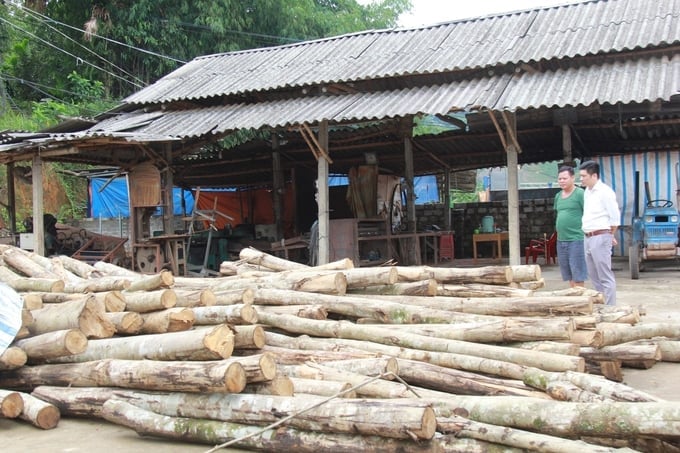
Outside the raw wood yard there was a backlog of raw materials, in the factory the machinery stopped operating. Photo: Thanh Tien.
However, from around mid-2022 until now, everything has gradually slowed down due to low wood prices, wood processing facilities have been forced to sell at low prices, and sometimes, there are even no buyers. Many establishments are struggling, and frustrated, and can only pray for the market to improve to reduce losses.
Mr. Nguyen Manh Huong's peeling workshop in Dong Bang village (Luong Thinh commune, Tran Yen district, Yen Bai) opened in 2010. In previous years, the factory operated quite stably, however from 2020 until now, the source of planted forest wood materials has gradually depleted. Especially from mid-2022 until now, product output has been very difficult, unable to sell.
According to Mr. Huong, currently, the concentrated source of wood at the factory is little, but there are more than 500m3 peeled boards left to fill 2 warehouses. From the end of 2022 until now, the factory has stopped operating, only occasionally starting the machines to prevent rust and damage.
Mr. Huong said that in the past, selling peeled board products was very easy, many businesses came to buy them for processing. However, currently, there are almost no buyers, occasionally people come with offers but the price is very low. 1m3 of finished wooden planks is priced lower than 1m3 of imported raw material logs.
"Now, if you decide to sell, it only brings about VND 700 - 800 thousand/m3. Compared to before, the price was always over VND 2 million/m3. Each carriage of wood of about 30m3 sold will lose about VND 40 million. That's why we accept to hold the goods until prices increase to avoid big losses", Mr. Huong said.
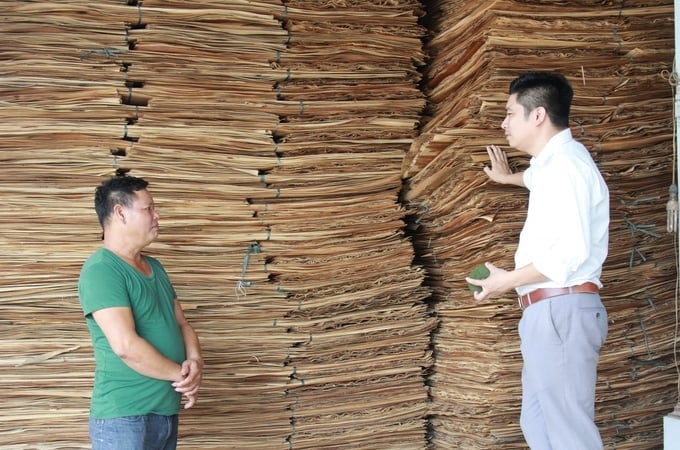
About 500m3 of peeled wood from Nguyen Manh Huong (Dong Bang village, Luong Thinh commune, Tran Yen district) is still in stock but cannot be sold due to the very low price. Photo: Thanh Tien.
Sharing the same situation, Mr. Duong Kim Tu's family's peeling board facility in Dong Bang village (Luong Thinh commune) was also in trouble. In 2019, when he saw that wood processing factories in the commune were doing well, Mr Tu concentrated capital to invest in opening a peeling factory right when the local wood processing industry began to decline and the planted forest wood material area was exhausted. The competition for raw wood is fierce. To have raw materials for production, processing facilities even have to purchase at high prices in other communes and districts.
Mr. Tu said: During peak operations, the factory processes dozens of cubic meters of raw wood every day with 6 regular workers and dozens of seasonal board drying workers. However, due to the low price of wood with loss when selling them, and no buyers, the factory had to stop operating from mid-2022 until now. Machines worth hundreds of millions of VND are left to rust. In the two warehouses of Mr. Tu's factory, there are still more than 400m3 of unsold peeled wood that cannot be sold. It is estimated that the value of finished wood planks is nearly a billion VND.
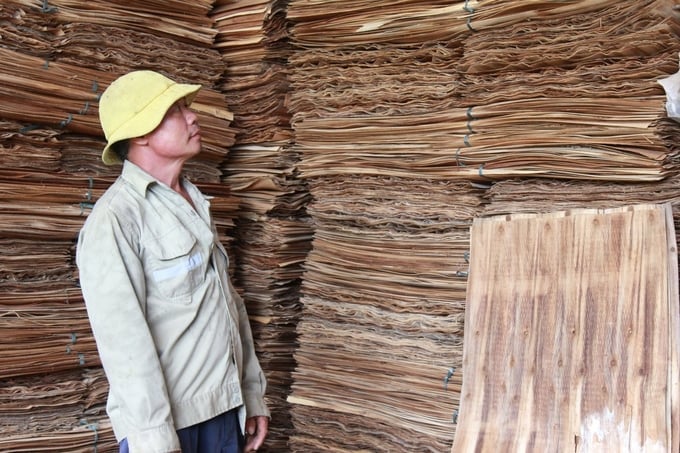
The low price of wood caused the peeling board facility of Mr Duong Kim Tu's family in Dong Bang village (Luong Thinh commune) to suffer. Photo: Thanh Tien.
According to data from the Tran Yen District Forest Ranger Department: By the end of September 2023, the whole district has 11 organizations and 69 households doing business, producing, and processing wood, In addition, there are thousands of small establishments processing peeled boards, woodchips, and civil carpentry processing. To date, there have been 2 organizations and 38 establishments that have stopped production and business, many establishments are operating on a moderate basis to wait for the market.
Luong Thinh commune is considered the "capital" of the wood processing industry for plantation wood in the Tran Yen district. During the peak of the wood processing industry, there was a time when this commune had over 100 establishments operating vigorously, creating jobs for hundreds of workers. The development situation makes processing facilities "hungry" for raw materials for production, even having to buy raw wood for processing. There are areas of acacia wood that are only 5-7 years old that have been harvested thoroughly.
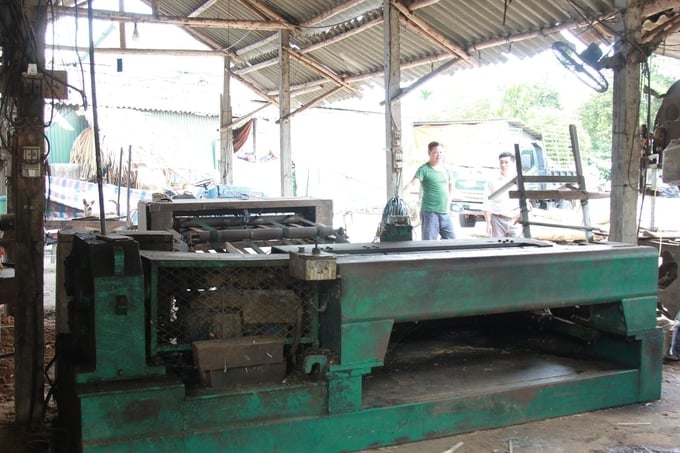
Many machines are abandoned because the processed products cannot be sold. Photo: Thanh Tien.
From mid-2022 until now, plantation wood production and processing facilities in the commune have encountered many difficulties, many establishments only operate moderately or stop operating. In the commune, there are over 20 factories that have asked to temporarily stop operating to avoid taxes.
Recently, many businesses and establishments processing wood and wood products in Tran Yen district have diversified products such as chipboard, plywood, and wooden furniture products from planted forest wood, creating stable jobs for 2,800 workers.
However, recently, businesses and wood processing facilities in Tran Yen are all suffering from the same miserable situation.
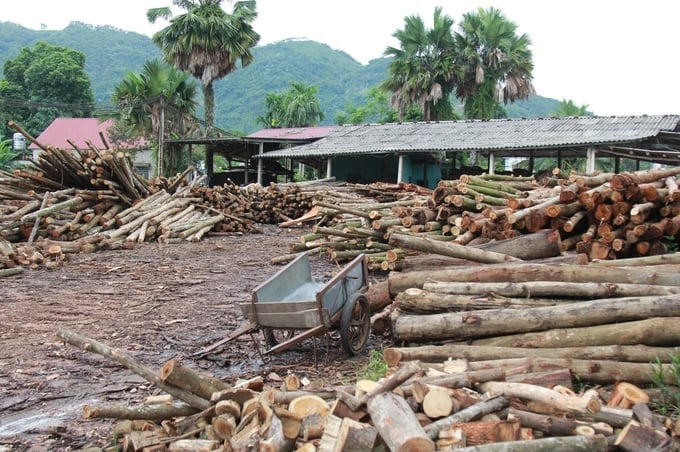
Many wood processing factories still have to maintain moderate operations because they still have raw materials, and if they don't process them, the materials will be damaged. Photo: Thanh Tien.
While processed peeled and plywood products still lie in large numbers in storage and cannot be sold, some wood factories still have to maintain production due to the remaining amount of raw wood that was ordered in advance and at the same time to retain workers. This further causes capital backlogs, warehousing and preservation costs to increase, while product quality declines.
Translated by Hoang Duy

(VAN) FAO’s Director-General addresses the 5th Baghdad International Water Conference.
/2025/05/26/1716-4-nongnghiep-191706.jpg)
(VAN) Chain linkages, technological innovation, and raw material zoning are three strategic pillars for the coconut industry to strongly develop and elevate its position on the global agricultural map.
![Advanced mariculture – an inevitable trend: [4] Accompanied by scientists](https://t.ex-cdn.com/nongnghiepmoitruong.vn/608w/files/sohk/2025/05/13/1941-pgsts-vo-van-nha-140958_717.jpg)
(VAN) According to Assoc. Prof. Dr. Vo Van Nha, Director of the RIA III, the development of advanced offshore mariculture is no longer an option but an essential path for Vietnam’s fisheries sector.

(VAN) Vietnam is intensifying the development of mollusk farming areas that meet international standards, aiming for sustainable growth and enhancing its export position in the global seafood market.
![Advanced mariculture – an inevitable trend: [3] Policy-driven momentum](https://t.ex-cdn.com/nongnghiepmoitruong.vn/608w/files/doanhtq/2025/05/21/0104-0616-0348-nuoi-bien-170339_789.jpg)
(VAN) To ensure the success of offshore mariculture that uses advanced technologies, it is essential to establish supportive policies that inspire both individuals and enterprises to invest with confidence.
![Advanced mariculture – an inevitable trend: [2] Outstanding results](https://t.ex-cdn.com/nongnghiepmoitruong.vn/608w/files/sohk/2025/05/12/4632-4136-nuoi-bien-11-164117_819.jpg)
(VAN) Pilot models of high-tech offshore mariculture in Vietnam, particularly in the South Central Coast region, have demonstrated exceptional economic returns and sustainability, setting a new direction for the country’s aquaculture industry.
![Advanced mariculture – an inevitable trend: [1] Moving offshore](https://t.ex-cdn.com/nongnghiepmoitruong.vn/608w/files/phucpm/2025/05/18/0252-2436-nuoi-bien-6-162148_783.jpg)
(VAN) Mariculture using advanced technology and moving offshore is an inevitable trend, as nearshore areas increasingly reveal limitations.